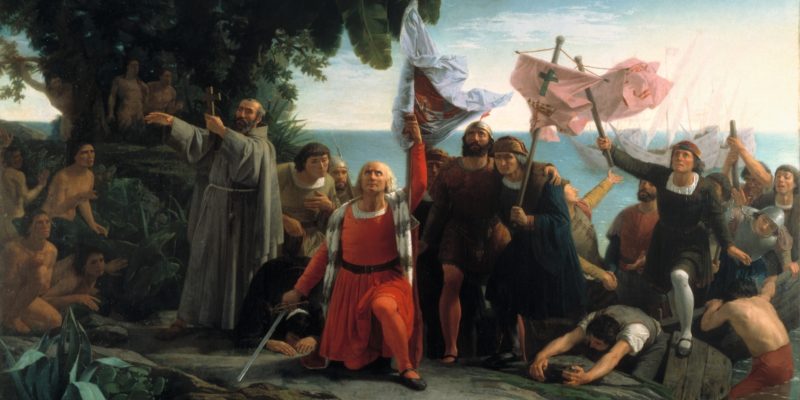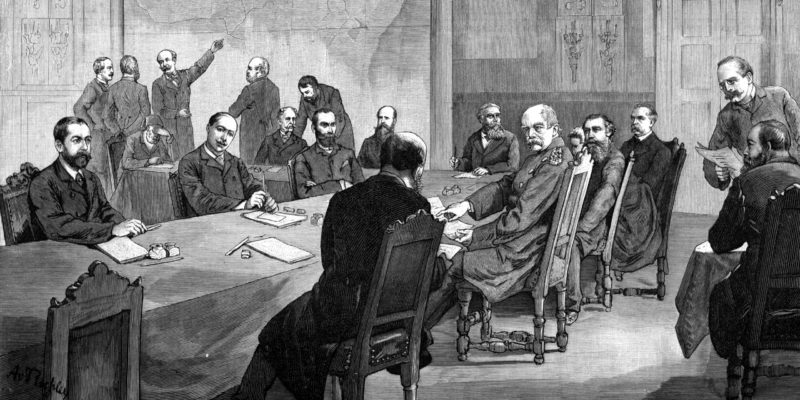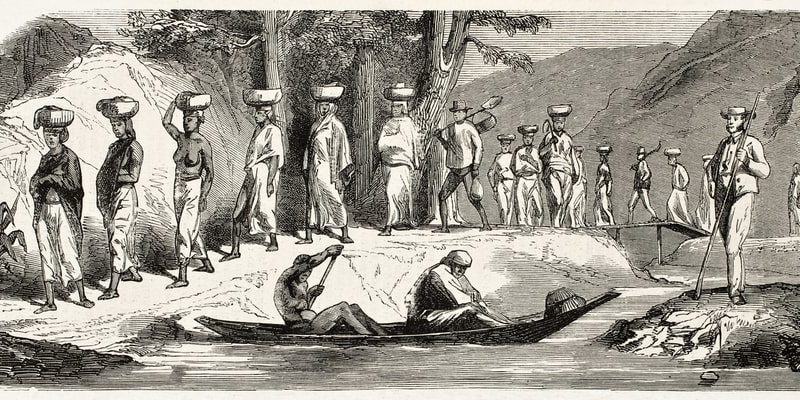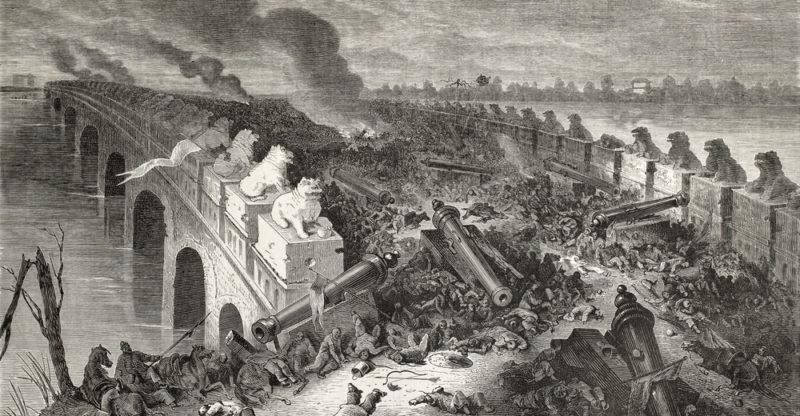Table of Contents
We explain what imperialism is, and discuss its causes and consequences. In addition, we explore its characteristics and the European empires.

What is imperialism?
The term "imperialism" makes reference to the political practices that establish a relationship of domination and subordination between nations. In imperialism, one of the nations is subjected to the other, which exercises authority in political, military, economic, and/or cultural matters. Thus, an agenda is imposed that favors the nation exercising domination.
Imperial domination can occur, on the one hand, through colonization, which involves the settlement of the colonized territory, economic exploitation, and/or military presence.
On the other hand, imperial domination can take place through cultural subordination or adaptation (sometimes referred to as "acculturation"). Imperial rule can be direct (if imperial authority is imposed politically upon the subjected territory) or indirect (if local forms of government are maintained under imperial control).
Imperialism is a long-standing political phenomenon in human history that has helped shape the contemporary global landscape. Many of today's unequal relations are derived from the imperial practices of the past. Some critics argue that imperialism is still in force given the way in which certain powers impose their economic agenda or employ their armed forces to achieve strategic objectives.
- See also: Feudalism
History of imperialism
The origin of empires
Empires have existed since ancient times, and their dynamics of conquest have followed similar patterns. For instance, the Roman Empire conquered territories by force and exerted political and economic domination over vast regions of the known world.
The Roman Empire, in particular, stretched across nearly all of Europe, North Africa, and the Middle East. During these periods of imperial domination, the religions, languages and customs of imperial centers were imposed or adopted in the subjugated territories. In many cases, the combination of the colonizing and colonized cultures led to syncretism, mixed cultural forms that permitted the survival of numerous practices and beliefs of subordinate societies.
While many historians use the term imperialism to refer to ancient imperial experiences, others reserve it to describe the European expansion that began in the 15th century or, more specifically, for the political and economic domination of regions in Asia and Africa from the mid-19th century onwards.
European imperialism
Global European expansion began in the 15th century and lasted until the 20th century. Spain, Portugal, the Netherlands, England and France led the early stages of colonization and imperial rule, especially in the Americas, where colonies achieved their independence after bloody wars in the late 18th and early 19th centuries.
During the 19th and early 20th centuries, a new form of imperialism fueled by industrial capitalism and nationalist ideologies led to the partition of much of the world, especially in Africa, Asia and Oceania, among nations such as England, France, Germany, Italy, Russia and even the United States and Japan. This period was followed by a time of wars of independence and decolonization processes in Asia and Africa that took place mostly following World War II.
During the stage of imperialism, the great European states imposed political, economic, and military controls upon less fortunate nations, where they managed to accumulate valuable resources and sell the goods manufactured in the metropolitan center or in other colonies.
Territories subjected to European imperialism
The most intense period of imperial expansion occurred between 1880 and 1914. Many historians consider the First World War to be a conflict largely driven by the prevailing imperial competition of the time. The main European colonial destinations were:
- America. Largely conquered and colonized from the late 15th century onwards, it was a source of raw materials, especially gold and silver. Following the Wars of Independence, it ceased to be a focal point for European imperial expansion. In turn, one of its nations, the United States, eventually became an expansionist power in its own right.
- Africa. Initially a source of slave labor, it continued to be exploited even after the abolition of slavery for mineral or exotic resources. In addition, it facilitated communication with Asia (as was the case with Egypt, which connected the Mediterranean Sea to the Indian Ocean).
- Asia. Exotic and luxury goods of Asian origin were highly valued in Europe (spices, porcelain, tea, silk) and became one of the main targets of imperialism on the continent. Moreover, raw materials for consumption and industry were also extracted in Asia, hand labor was exploited, and markets for manufactured products were opened. One of the most significant examples of colonial imperialism in Asia was the British Raj in India.
The partition of Africa

Between 1884 and 1885, during the height of European expansion, the imperialist powers agreed on the partitioning of the African continent at the Berlin Conference. Representatives from the 12 most powerful nations of Europe were present (Great Britain, France, Germany, Belgium, Portugal, the Netherlands, Austria-Hungary, Spain, Russia, Italy, Sweden-Norway, and Denmark), along with the Ottoman Empire and the United States.
At the end of the conference, nearly the whole of the African continent had been divided according to European interests, disregarding the ethnic differences and needs of the indigenous populations. As a result, several African nations have completely straight borders to this day, as these were drawn on maps with a square and a bevel.
Only two African nations remained free from European imperial domination before the decolonization processes: Liberia and Abyssinia (Ethiopia). The rest was divided between Great Britain, France, Germany, Belgium, Italy, Portugal, and Spain.
Causes of imperialism

European imperialism was driven by several causes, including:
- The need for raw materials. Western Europe required a steady flow of raw materials to fuel the capitalist industry that made large-scale manufacturing of products possible. Colonial imperialism facilitated the extraction of raw materials from less developed countries through the use of local hand labor, whether slave or wage-earning. It also provided markets in the colonies for goods produced in the metropolitan center.
- Competition between empires. The various empires of Europe vied for the control of other territories to gain economic advantage and position themselves politically. They were also spurred by expansionist claims of nationalism. In an age of protectionism, they also competed for the control of maritime trade routes, which were the commercial hubs of the time.
- World exploration and science. The rise of European science and technology encouraged exploration and the discovery of species and materials that would yield industrial advantages or scientific superiority over other empires.
- Social Darwinism. The prevailing ideology in Europe since the mid-19th century drew from the recent studies of Charles Darwin, who had observed that the evolution of species depended on natural selection ensuring the survival of the fittest. Darwin's biological observations were applied to the study of the human being, positing the idea that superior or civilized populations were destined to rule, and inferior or backward societies were destined to obey and receive the benefits of progress from the former. Today, this notion is deemed false, as well as morally reprehensible.
Consequences of imperialism

Among the various consequences of European imperialism are:
- The consolidation of European industrial economies and the expansion of capitalism: This granted a commercial advantage to Western powers (and to Japan in Asia) in the global competition of the 20th and 21st centuries.
- World War I (1914-1918): It redefined the map of Europe, Asia, and parts of Africa with the fall of the Russian, Ottoman, Austro-Hungarian and German empires, paving the way for World War II (1939-1945). The latter further consolidated the political and economic power of the United States.
- Struggles for Liberation from Imperial Yoke: The subjugated populations fought to liberate themselves from the imperial yoke and establish young nations, as had happened in Latin America in the 19th century and during the decolonization processes in Asia and Africa in the 20th century.
- Expansion of the languages of the imperial powers: The languages of the imperial powers are still spoken or are even the official languages in many of the territories that were under colonial domination.
- European multiculturalism: It developed in subsequent centuries, when many citizens emigrated from colonial territories to metropolitan centers in search of better living conditions.
Unequal economic relations
Imperialism established unequal economic relations. The population of subjugated territories had to hand over raw materials or other resources to the colonial center, and in turn, often had to consume manufactured products or cultural goods introduced by the colonial power, which also governed or administered the territory.
This exchange occurred between local producers and imperial officials or European companies, which often received trade and monopoly permits in the colonies. In general, a paternalistic relationship was established: Europeans perceived themselves as civilizers and thus justified the benefits they obtained from their ties with indigenous populations.
As part of this allegedly civilizing task, a European education (traditions, language, and religion) was usually imposed upon the locals. While the most favored segments of this exchange were the elites of the metropolis, the privileged sectors of the colonies could often enrich themselves or rise socially and politically due to their relationships with the colonizers or by serving the colonial government.
Imperialism and colonialism
Imperialism and colonialism should not be conflated; yet they are related processes.
Colonialism is a political-economic system characterized by extractivism, which occurs when a powerful state occupies the territory of a weaker one with officials and settlers. It subjects the indigenous population to conditions of subordination, servitude or slavery, and imposes laws and systems of government that favor the colonial center.
Imperialism, on the other hand, is a form of expansion and domination that may or may not occur in colonial terms, that is, without involving the physical occupation of the dominated territory or through military occupation alone. Some scholars refer to cultural imperialism when cultural impositions are promoted, and to economic or commercial imperialism when domination occurs through economic inequalities between the imperial center and the territory.
European empires between the 15th and 20th centuries
The main European colonial empires were:
- The British Empire (16th-20th centuries).
- The Spanish Empire (16th-20th centuries).
- The German Empire (19th-20th centuries).
- The Portuguese Empire (15th to 20th centuries).
- The French Colonial Empire (17th-20th centuries).
- The Russian Empire (18th to 20th centuries).
- The Dutch Empire (17th-20th centuries).
- The Danish Colonial Empire (13th-20th centuries).
Imperialism and capitalism
It is widely accepted that 19th-century imperialism was spurred by the needs of European industrial capitalism, especially in Great Britain.
The extraction of raw materials and the exploitation of labor, as well as the sale of manufactured goods and investments in capital assets to modernize transportation and communications in the colonies, among other factors, represented a major boost to the economies of the great Western capitalist powers, which were still experiencing the effects of the Industrial Revolution.
Some theoretical interpretations, such as the one upheld by Marxism, even posited that 19th-century European imperialism had been an advanced phase of capitalism oriented towards the concentration of capital in a monopolistic sense.
In truth, the growth experienced by the colonial powers occurred at the expense of the productive capacities of the colonies. Moreover, even after decolonization, many nations remained in a relationship of economic, financial and technological dependence on Europe or on other powers such as the United States.
Was this information useful to you?
Yes NoThank you for visiting us :)